Portfolio of Issa Rice
This page showcases the work I have done, in portfolio format. This page is organized into two sections:
- Projects – this section lists some of the biggest projects I've worked on over the past few years
- Interests/focus areas – this section groups my work by "interests" or "focus areas"; it re-lists my major projects and also includes my smaller work
See my work page or my contract work profile on Vipul Naik's website for a more complete listing of my work.
Projects
This section lists some of the major project I have worked on.
AI Watch
AI Watch is a website to track the technical agendas, people, organizations, products, and other aspects in the field of AI safety and alignment.
I decided to create AI Watch for several reasons: (1) I kept hearing people say things like "depending on how your count, there are only around 60 AI safety researchers in the world" without an accompanying list of such people – if there were so few researchers, it shouldn't be difficult to make such a list! (2) I was trying to decide if I should work on AI safety, and one input to my decision was to get a fine-grained understanding of the landscape of the field – all the people working in it, the organizations, the number of people trying to enter the field, and so forth. (3) Based on the popularity of the annual AI safety literature review by Ben Henry (2016, 2017, 2018) and a blog post on funding in AI safety by Sebastian Farquhar, I thought there was demand for tracking the state of the field.
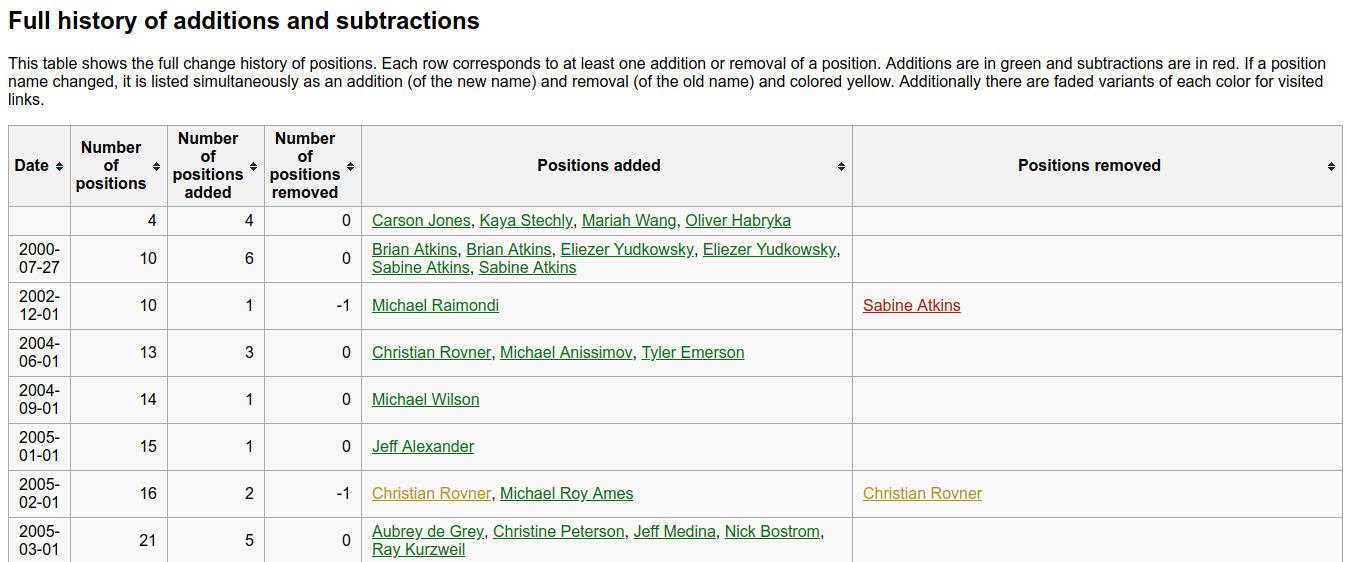
Donations List Website (DLW)
A website created by Vipul Naik to track foundation giving as well as personal donations (mostly by people associated with the effective altruism movement). I don't host the website, but I've done a lot of development work on the site, including scraping and processing grants data and adding new features to the site. I am also the author of the tutorial for the site, which explains the basic features.
Do you remember the bad old days when effective altruists would post their donation decisions and amounts on their personal blogs or on Effective Altruism Forum, and there was no central repository of this information? Thanks to DLW, finding and analyzing personal donations data has become a lot simpler.
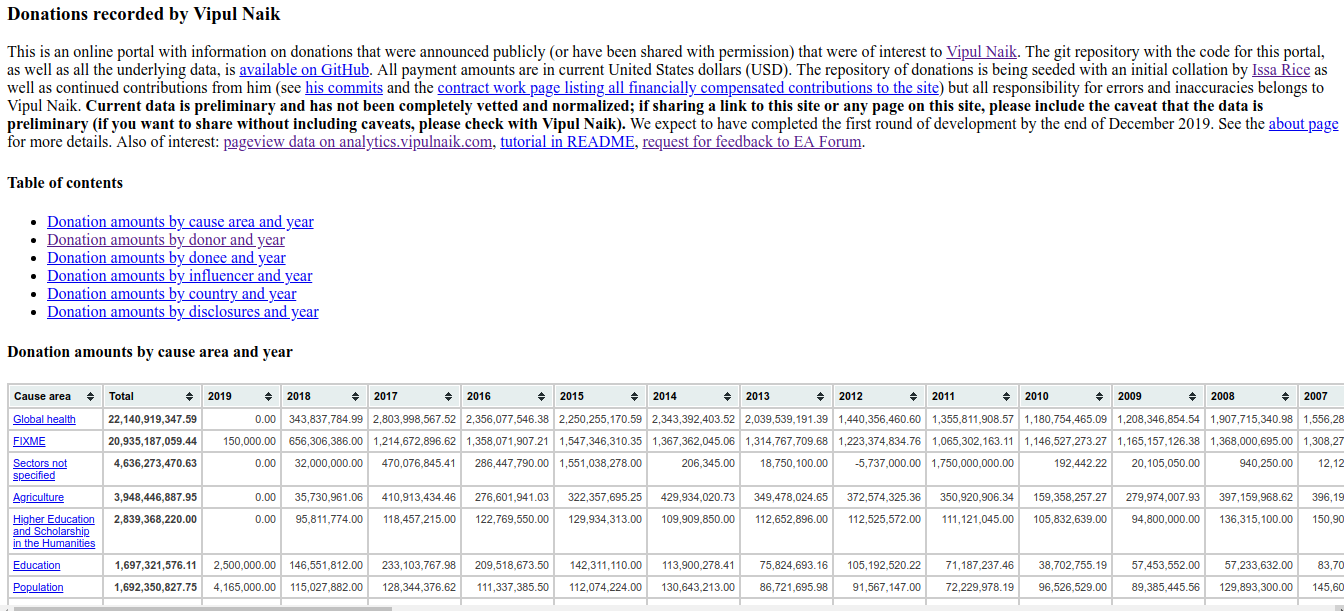
Org Watch
A generalization of AI Watch to organizations outside of AI safety. Even though Org Watch uses the same database and website code as AI Watch, it has different motivations (observe that none of the motivations I listed for AI Watch carry over to a generalization of it outside of AI safety): the idea is to try to understand an organization's trajectory by looking at its growth, changes in direction, external commentary, and so forth. By collecting all of this information in a single place, Org Watch hopes to be a useful resource for (1) those who are interested in an organization's work, and (2) those who are interested in working at an organization.
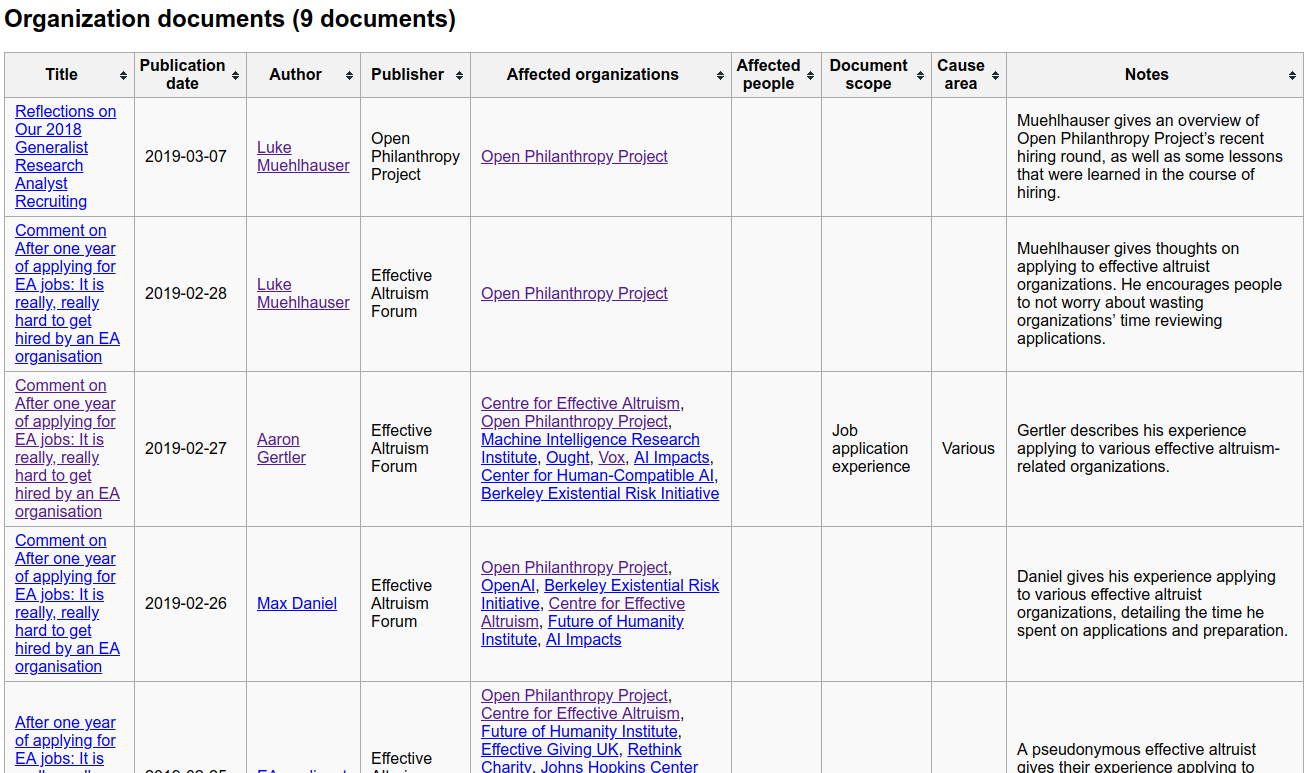
Cause Prioritization Wiki
A wiki that I started which collects information about cause prioritization. I started this project as a college freshman, with guidance from Vipul Naik. The premise of the wiki was that since there are some organizations doing in-house cause prioritization work without publishing much of it, there would be a lot of value in a group of people doing the same kind of work in public, making all of the reasoning transparent.
It turns out that finding contributors who are willing to put in a lot of work is difficult, and my own time was split between several projects (and, when I originally started the wiki, school), so the wiki has not made as much progress as I would have liked at the start.
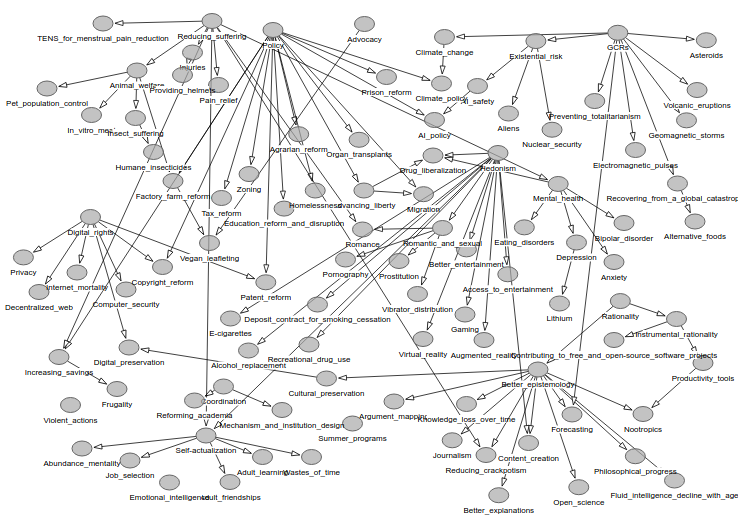
Timelines Wiki
A wiki I host that serves timelines on various topics (EA and rationality, global health, tech startups, etc.). Note that I've only written a small fraction of the timelines on the site (I think a majority of the timelines have been written by Sebastian Sanchez).
Why focus on timelines? I think writing a timeline is a good first step in trying to understand a topic, because you don't need to read things chronologically (but the output will still be chronological). So you can go in confused about a topic and slowly get to build a good history of it, piece by piece. It's a way of doing "due diligence" on a topic. I think many people try to understand a topic without even doing anything comparable to writing a timeline, i.e. they just dive in and they don't even know the basic events that have happened for that topic, which leaves them confused.
I have also found timelines useful for answering questions. For example, I answered a question about the history of the Center for Applied Rationality (CFAR) by using the timeline of it that I had already written, plus some internet searches.
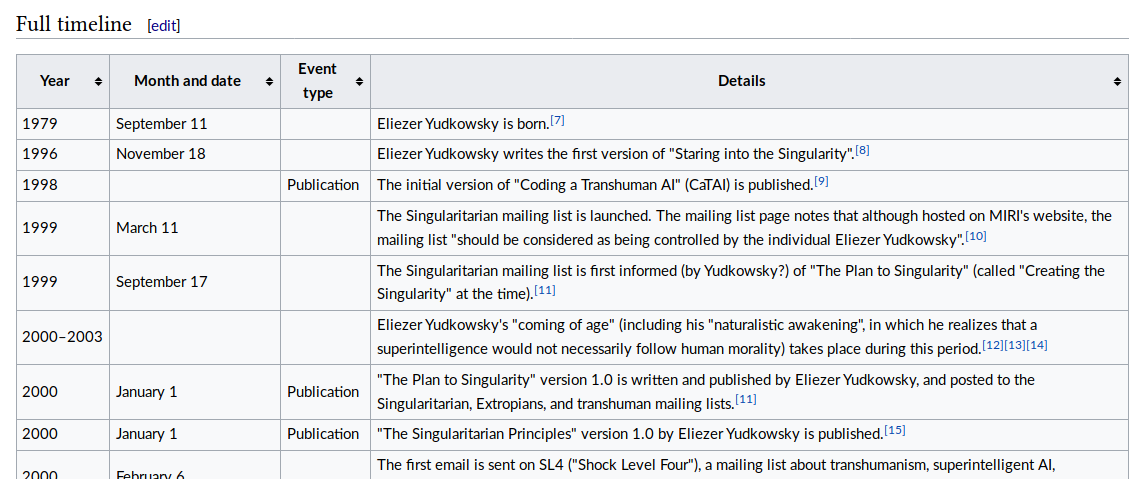
Some of the timelines I've written (note that others may have contributed to the timeline):
- Timeline of Against Malaria Foundation
- Timeline of Machine Intelligence Research Institute
- Timeline of Center for Applied Rationality
- Timeline of Berkeley Existential Risk Initiative
- Timeline of AI safety
- Timeline of Carl Shulman publications
- Timeline of Wei Dai publications
- Timeline of libertarianism in the United States
- Timeline of Niskanen Center
- Timeline of Ludwig von Mises Institute
- Timeline of Cato Institute
- Timeline of Bitcoin
Tao Analysis Solutions
This is a blog where I post solutions to the exercises in Terence Tao's Analysis I. I have a bunch of reasons why I started this blog that I hope to write about more in the future.
Math notes
As I learn math, I sometimes write up notes about what I'm learning. I am especially interested in writing pages in a style of exposition (involving tabular presentation, emphasizing mental representations, saying things in multiple ways) that I feel is neglected in existing math textbooks.
Learning Subwiki
A wiki hosted by Vipul Naik about learning and teaching. Most of my work on the wiki has been about autodidacticism – learning techniques and strategies to use when self-studying. Some of the pages I've written (these are pretty incomplete):
Interests/focus areas
This section lists some areas where I have done substantial work in. Some of the projects from the previous section are also listed here.
AI safety and alignment
This is my current main interest and my best current answer to the question of “What's the most important thing to work on (for myself)?” Here’s some work I’ve done in this area:
- AI Watch; explained elsewhere in this portfolio
- Deliberation as a method to find the “actual preferences” of humans
- Comparison of decision theories (with a focus on logical-counterfactual decision theories)
- Plausible cases for HRAD work, and locating the crux in the “realism about rationality” debate
- Timeline of MIRI
- Timeline of FHI
- Timeline of AI safety
- Collection of people’s views on AI safety
- Timeline of decision theory
- I am a collaborator on the Modeling Transformative AI Risk (MTAIR) project, and a co-author on the Analogies and General Priors on Intelligence post in the sequence
- I have a bunch of scattered thoughts here on my personal wiki
- Questions I’ve posted to LessWrong:
- Is it harder to become a MIRI mathematician in 2019 compared to in 2013?
- What are the differences between all the iterative/recursive approaches to AI alignment?
- Degree of duplication and coordination in projects that examine computing prices, AI progress, and related topics?
- Source code size vs learned model size in ML and in humans?
- How does iterated amplification exceed human abilities?
- What are some exercises for building/generating intuitions about key disagreements in AI alignment?
Effective altruism and rationality community meta
- LessWrong analytics (February 2009 to January 2017)
- LessWrong 2.0 Reader and EA Forum reader – a fast and JavaScript-free way to browse LessWrong 2.0 and the Effective Altruism Forum
- Timeline of Carl Shulman publications
- Timeline of Wei Dai publications
- Timeline of Center for Applied Rationality
- Timeline of the rationality community
- Timeline of effective altruism
- Articles on LessWrong Wiki:
Health, biology, immunology, chronic illness
Since 2019 I have been suffering from a mysterious chronic illness (probably some kind of autoimmune or pre-autoimmune disease or some sort of other immune disorder). Naturally, I've done a bunch of reading about this and have even written a few things.
- Immune book flashcards – 483 flashcards on an introductory immunology text; I was interested in this book because I wanted to learn more about how the body works to hopefully figure out more about my mysterious chronic illness (collaboration with Chantal M.)
- LessWrong shortform post solicing feedback about what I should write about with regard to my illness
- My thoughts on breathing, with an emphasis on dealing with chronic shortness of breath (working title; work in progress). This document collects together everything I have learned about shortness of breath or “air hunger”. For the moment it’s half-guidebook and half-research notebook, but eventually I am hoping to turn it into a complete guide on curing the kind of shortness of breath that does not show up on standard medical testing.
- Why is capnometry biofeedback not more widely known?
- How to get nerds fascinated about mysterious chronic illness research? – a question post on LessWrong where I wonder outloud how to get more of a particular kind of person interested in solving mysterious chronic illnesses like the one that I have
- Idea: medical hypotheses app for mysterious chronic illnesses
- Gödel, Escher, Bach Typogenetics/DNA/RNA Flashcards (collaboration with Chantal M.)
Internet usage
As someone who spends a lot of time on the internet, I'm interested in the questions “How can I get more value out of the internet?” (using the internet effectively) and “How can I create more value on the internet?” (content creation).
- Using Reddit
- Content Creation Wiki
- How to Write Facebook Graph Search Queries
- How to Navigate to Web Pages Efficiently Without Using Navigation Menus
Web analytics
- Analytics table for Vipul Naik's projects
- Timeline of Wikimedia analytics (original), written with Vipul Naik
- A blog post about LessWrong analytics
- I wrote the script that generates the summary table on the front page of Timelines Wiki (which includes some pageviews data)
Digital preservation
Learning
I am interested in optimizing my learning (at the moment, this means figuring out how to self-study math better). Even though I enjoy learning, I hate school (even though I do well in school) and prefer to learn "at my own pace" (for more, see my UW course reviews, and my Quora reviews of high school and junior high).
- Learning Subwiki
- The Learning and Spaced repetition categories on my personal wiki have my most recent thoughts about these topics
- Spaced proof review is a method I've developed for deeply understanding math and retaining that understanding
- LessWrong comment about using Anki for AI safety
- My page about Anki has more info
- I converted “Leverage Points: Places to Intervene in a System”, an article by Donella Meadows, into the mnemonic medium by adding Orbit spaced repetition prompts
- I wrote Understanding the material conditional for the 3Blue1Brown Summer of Math Exposition 1; the post is written in the mnemonic medium (includes Orbit prompts throughout). This was a topic I have always wanted to explain, and I see this piece as a kind of test to put into practice all of my thinking about how to write good explanations.
- Tao Analysis Flashcards is a website that provides Orbit prompts for Tao's Analysis I textbook
- Musings on math explanations
Transparency and public discourse
Computing
Occasionally I have written how-to guides and such for software I've used.
I also have written some pieces of software. You can find all of my software at my GitHub profile (the vast majority are data processing, web scraping, website code). One notable project is:
- Citewebgen, a bookmarklet to generate citation information for web pages
I've written some plugins and documentation pages for Vim, the text editor.
- pasteurize.vim – a plugin for Common User Access cut, copy, and paste
- dualist.vim – a plugin to make list mode non-annoying
- mediawiki.vim – unobtrusive syntax highlighting and minimal autocompletions for MediaWiki files
- Working with long lines – strategies for handling long lines in Vim
- Unused keys – an index of unused keys in Vim, as an aid to deciding which keys can be mapped
- Linting – a tutorial for working with linting systems
I’ve also occasionally submitted bug reports to free software/open source projects:
Global health and poverty
Some of my work for Vipul Naik has involved learning about global health and poverty, and I've written several Wikipedia pages about topics in global health. This is not an active interest these days.
I have to admit I found working on global health somewhat emotionally challenging because I was never a "true believer" of it. I had always thought existential risk reduction to be a more important way to improve the world, so working on global health and poverty felt quite demotivating at times (but the general nature of doing research and writing was still enjoyable). Why did I work on it if I didn't believe in it? It was a combination of (1) wanting to get research experience, (2) wanting to work with Vipul, and (3) wanting to build up a financial savings buffer.
Other interests
I'm also interested in many other things that are kind of broad/vague and where I haven't done any concrete work in. Examples: understanding people and how they make decisions (sales and signaling, how people make life decisions, how people make and maintain friends), finding smart people and communities, philosophy (metaethics, what to value, consciousness, decision theory), evolutionary psychology, coordination and group decision making.
You can find some of my project ideas in my project ideas repository.